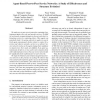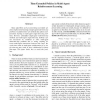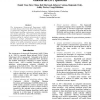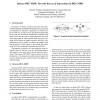ATAL
2004
Springer
14 years 5 months ago
2004
Springer
We study peer-to-peer service networks consisting of autonomous agents who seek and provide services. To fulfill its local needs, an agent attempts to discover and select informa...
ATAL
2004
Springer
14 years 5 months ago
2004
Springer
Many algorithms such as Q-learning successfully address reinforcement learning in single-agent multi-time-step problems. In addition there are methods that address reinforcement l...
ATAL
2004
Springer
14 years 5 months ago
2004
Springer
The Autonomous Sciencecraft Experiment (ASE), currently flying onboard the Earth Observing-1 (EO1) spacecraft, integrates several autonomy software technologies enabling autonomou...
ATAL
2004
Springer
14 years 5 months ago
2004
Springer
ATAL
2004
Springer
14 years 5 months ago
2004
Springer
The goal of autonomic computing is to create computing systems capable of managing themselves to a far greater extent than they do today. This paper presents Unity, a decentralize...
ATAL
2004
Springer
14 years 5 months ago
2004
Springer
In this paper, we investigate a model of a combinatorial, procurement multi-attribute auction, in which each sales item is defined by several attributes called quality, the buyer...
ATAL
2004
Springer
14 years 5 months ago
2004
Springer
In prior work we established how physicomimetics can be used to self-organize hexagonal and square lattice formations of mobile robots. In this paper we extend the framework to mo...
ATAL
2004
Springer
14 years 5 months ago
2004
Springer
Most people have long term information interests. Current Web search engines satisfy immediate information needs. Specific sites support tracking of long term interests. We prese...
ATAL
2004
Springer
14 years 5 months ago
2004
Springer
We propose an adaptive 1-to-many negotiation strategy for multiagent coalition formation in dynamic, uncertain, real-time, and noisy environments. Our strategy focuses on multi-is...
ATAL
2004
Springer
14 years 5 months ago
2004
Springer
This paper describes our work constructing a generalized framework for modeling multi agent interactions in education-related applications. Historically, interactive learning syst...




